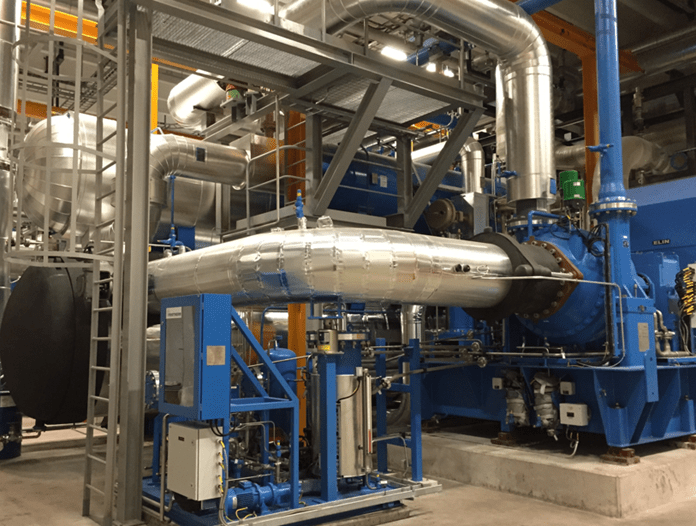Utilitas is building the first large heat pump plant in Paljassaare in Tallinn, producing clean thermal energy from treated wastewater and seawater. The Paljassaare heat pump plant with a total capacity of 110 MW will start providing heat to the district heating network in 2026.
The zero-emission heat pump plant uses thermal energy from treated wastewater and seawater as input and raises it to a temperature suitable for the district heating network with the help of green electricity. The integration of Tallinna Vesi’s Paljassaare wastewater treatment plant, seawater, heat pumps and district heating system is an innovative and environmentally friendly solution that will be introduced in Estonia for the first time.
“Already today, more than 2/3 of the heat consumed by Tallinn’s district heating customers is produced either from renewable sources or is waste heat. During the last years we have installed industrial heat pumps in our combined heat and power plants to use most of the energy contained in the flue gases. The Paljassaare heat pump plant is the next big step forward and it will help us to take advantage of the low-temperature heat contained in treated wastewater and seawater and thus reduce the share of fossil fuel used in the capital’s district heating to less than 10% by 2027,” explained Priit Koit, CEO of Utilitas.
Large-scale industrial heat pumps are seen by both the European Commission and the International Energy Agency as the best available solution for reducing Europe’s dependence on natural gas. The directly applicable Council of Europe Regulation 2022/2577, which entered into force at the end of 2022, made the construction of industrial heat pumps an overriding public interest. In addition to the Nordic countries, in recent years large heat pumps will be installed all over Europe.
The Paljassaare heat pump plant will reduce carbon dioxide emissions associated with the city’s heat supply by about 100,000 tons per year, replacing fossil fuel-based heat production. A similar effect cannot be achieved in urban environments due to noise, lack of space and capacity constraints in the power network with the use of small, building-based heat pumps – the Paljasaare heat pump plant is estimated to be comparable to 15 thousand local, 7.5 kW heat pumps. Also, industrial heat pumps connected to the district heating network have high reliability and are backed up with other heat production equipment connected to the same network.
Preparatory work for the construction and design of the heat pump plant were started in Paljassaare already this year. The construction of the plant will begin in the first half of 2025, and the plant will start providing heat to the Tallinn district heating network in the second half of 2026. In addition to district heating, the waste heat from treated wastewater and seawater can also be used at the plant for the production of district cooling.
“Cities have a key role to play in achieving the European Union’s climate goals, as most CO2 emissions come from cities. Tallinn has set a clear goal to become a climate-neutral city by 2050, and we will achieve the fastest effect in transferring our district heating system to fully renewable fuels. With the creation of the Paljassaare heat pump station, we will get closer to meeting our goals. Tallinn is pleased that our district heating partner Utilitas shares our goal of climate neutrality and is investing in new climate-friendly technologies to achieve this goal,” said Jevgeni Ossinovski, Mayor of Tallinn.
The main equipment, i.e. heat pumps with a heat capacity of 110 MW, is supplied by the long-established Swiss company Friotherm, which has installed large heat pumps in many European cities, including both Sweden and Finland.
“We are proud to collaborate with Utilitas on this groundbreaking project in Tallinn. Our extensive experience in installing and optimizing large heat pumps in European cities has demonstrated that this technology can play a pivotal role in supporting cities on their path to decarbonizing their heat supply and becoming independent from fossil fuels. The rising awareness and interest in large scale heat pumps demonstrates the significance of this technology,” says Leszek Wojtan (PhD), Head of International Sales at Friotherm AG.

Pildil on näide paigaldatud suurest tööstuslikust soojuspumbast (allikas: Friotherm)
Friotherm engineers, manufactures, installs and services heat pumps and chillers with technologies and solutions that help clients to improve their business. Friotherm is widely recognized as the leading and most experienced manufacturer of large-capacity heat pumps with centrifugal compressors for district heating and industrial applications. The activities of Friotherm are supported by a worldwide sales and service network. Through the development of innovative technologies, along with tailored solutions in the district heating and cooling sector, Friotherm has earned outstanding reputation. Their products significantly contribute to reducing CO2 emissions, becoming independent from fossil fuels and improving energy efficiency.